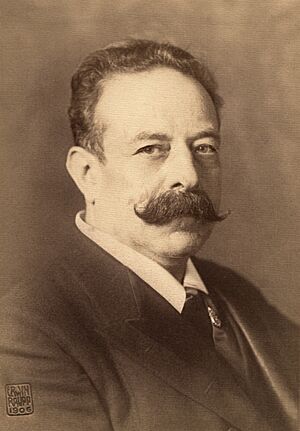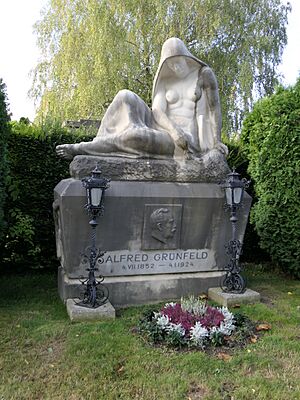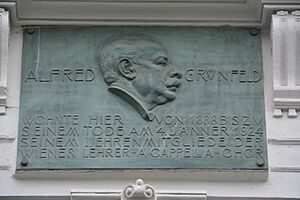Alfred Grünfeld facts for kids
Quick facts for kids
Alfred Grünfeld
|
|
|---|---|

Alfred Grünfeld 1906.
|
|
| Born | 4 July 1852 |
| Died | 4 January 1924 (aged 71) |
| Occupation | pianist and composer |
Alfred Grünfeld (born July 4, 1852, in Prague; died January 4, 1924, in Vienna) was a famous Austrian pianist and composer. He was known for his amazing piano skills and his fun personality.
Contents
Life
Alfred Grünfeld was born in Prague. He was the second of eight children in a musical Jewish family. His father, Moritz Grünfeld, was a leather merchant. Alfred's siblings also loved music. His brother, Heinrich Grünfeld, became a cellist.
Alfred showed musical talent very early, at just four years old. He started learning music with Julius Theodor Hoeger. He gave his first public concert when he was only 12. Later, he studied at the Prague Conservatory with Bedřich Smetana. He also studied in Berlin.
In 1871, a young Gustav Mahler stayed with the Grünfeld family in Prague. Mahler was 11 years old at the time. His stay was not very pleasant. Mahler's wife later said that he had a difficult time there. Another family member said the Grünfeld children were "rascals." They found Gustav's shyness confusing.
In 1873, Alfred Grünfeld moved to Vienna. He lived there for the rest of his life with his sister Emma. He became a very popular pianist in Vienna. He played in many fancy homes and big concert halls. He often performed with famous groups like the Arnold Rosé Quartet. He also toured and played with his brother Heinrich.
Alfred Grünfeld traveled all over Europe and even to the USA. He received many awards for his performances. Some of these included being named a "k. k. Kammervirtuose" (a special title for court musicians) and receiving various orders from different countries. In 1897, he became a professor at the Music and Arts University of the City of Vienna.
People loved Alfred Grünfeld not just for his music. They also enjoyed his friendly and witty personality. He was known for telling funny stories and jokes. He was good friends with the famous composer Johann Strauss II. Strauss even dedicated his "Frühlingsstimmen Waltz" to Grünfeld. Alfred was famous for playing his own versions of Strauss's waltzes. He often played the "Frühlingsstimmen" as an extra song at the end of his concerts.
Alfred Grünfeld passed away on January 4, 1924. He was buried in the Vienna Central Cemetery. His grave has a special memorial.
Recordings
Alfred Grünfeld was one of the very first pianists to make commercial recordings. His first recording was made in 1889. This was on a wax cylinder for the Edison Phonograph. He recorded his own "Kleine Serenade" and other pieces. One of his recordings, "Ungarische Rhapsodie," was found and restored in 2012.
Between 1899 and 1915, Grünfeld recorded many discs. He recorded 94 classical and romantic piano pieces. These included works by famous composers like Frédéric Chopin, Edvard Grieg, and Robert Schumann. He also recorded 50 discs of his own music. He even recorded for special player pianos between 1905 and 1911.
Composition
Besides being a performer, Alfred Grünfeld also composed music. He wrote about 100 pieces for piano. He also composed songs and chamber music. Most of his piano works were in a style called "salon music." His most famous piano piece was "Kleine Serenade" from 1888. He also wrote very difficult piano pieces. These were often his own versions of other famous works. Many of these were not published but can be heard on his recordings.
Grünfeld also composed two operas. One was a light opera called Der Lebemann (The Man About Town). It first played in Vienna in 1903. The other was a funny opera called Die Schönen von Fogaras (The Beauties of Fogaras). It was performed in Dresden in 1907. While these operas were not huge hits, some songs and parts from them became well-known.
Here are some of his works for the piano:
- Octave-study, Op. 15
- Minuet, Op. 31
- Spanish Serenade, Op. 37
- Tanz-Arabeske, Op. 41
- Romanze, Op. 42
- Ungarische Fantasie: mit Benutzung von Nationalmotiven, Op. 55 (1912)
- Johann Strauss II: Transcriptions & Paraphrases for Solo Piano - Die Fledermaus, Op. 56
- Soirée de Vienne, Konzertparaphrase über Johann Straußsche
- Walzer-Paraphrase about Frühlingsstimmen, Op. 410 by Johann Strauss
- Kaiser-Walzer
Images for kids
 | Victor J. Glover |
 | Yvonne Cagle |
 | Jeanette Epps |
 | Bernard A. Harris Jr. |




